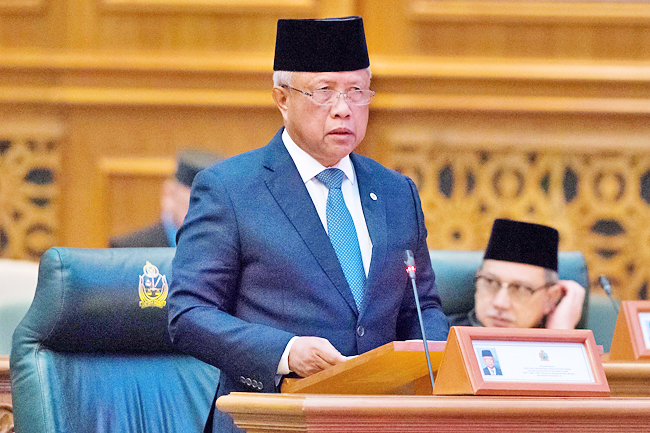Rokiah Mahmud
Minister at the Prime Minister’s Office and Minister of Defence II Yang Berhormat Pehin Datu Lailaraja Major General (Rtd) Dato Paduka Seri Haji Awang Halbi bin Haji Mohd Yussof yesterday shared a number of matters pertaining to issues discussed during the 19th Legislative Council (LegCo) session particularly related to the Prime Minister’s Office (PMO) and departments under it.
In his adjournment speech, the minister spoke on the appointment of top positions in the public sector and holding the acting positions for a long time. The PMO in collaboration with government agencies through the whole-of-government approach will continue to address these issues in accordance to the existing regulations and guidelines.
He ensured that officers who will be appointed are those with potential, competent, and able to contribute and make a significant impact on the progress of the organisation, whether in the ministries or departments.
The minister said that in ensuring efficient service delivery, PMO through the Public Service Commission has undertaken initiatives including the PSC Recruitment 2.0 (PSCR 2.0) enhancement; solidifying the guidelines, regulation updates and talent pool methods.
Regarding planning in ensuring succession planning in the public sector, every ministry and department will be reminded to use the succession planning guidelines provided by the Public Service Department. The minister added the identified senior officers in each ministry and department will be given a leadership development course under the Civil Service Leadership Pipeline managed by the PMO. Among the programmes, are Young Executive Programme (YEP), Executive Development Programme for Middle Management Officers (EDPMMO) and Executive Development Programme for Senior Government Officers (EDPSGO).
Several programmes are being offered at the Civil Service Institute (IPA) and it is a professional certification in various fields including management and leadership. On this note, IPA is also preparing the Public Service Capability Development Framework (PSCDF) to measure the capability of public service to support and implement strategies, initiatives, and programmes of ministries and departments.
Public servants should take advantage of the training provided to build human resource capabilities in their organisations.


In the aspect of organisation productivity related to leadership, service delivery and innovation, the minister said various opportunities and programmes are being provided aimed to assist ministries or departments to enhance their productivity through leadership development and training courses.
The minister shared that peace and stability of the Sultanate will never be compromised especially on elements trying to influence the mind of people with deviant teachings as well as those against the concept of Malay Islamic Monarchy (MIB). For this, PMO through several agencies and enforcement will continue to develop strategies to maintain political stability, defending sovereignty, and connect defence and diplomatic capabilities as well as preparedness in addressing security threats.
These include efforts to combat criminal activities by strengthening the capabilities of relevant agencies. The PMO will remain vigilant against cross-border crimes such as cybercrime, smuggling and distribution of illegal drugs and goods as well as human trafficking.
The minister reminded that in maintaining peace, cooperation is needed from all levels particularly grassroots leaders and the public.
The minister expressed appreciation for the assistance and information from the public to combat and apprehend criminals eventually leading to solving several cases.
The Department of Energy at the PMO will continue to implement the strategies that have been outlined to maximise the output from oil and gas resources, which is to ensure production is maintained at a level of 300,000 barrels per day in the short term, and further increased to 350,000 barrels per day in the long term. He added, this can be done by advancing reserve that have been discovered through various innovative and cost-effective initiatives, as well as increasing investment and exploration activities to discover new sources of oil and gas.
Meanwhile, in the downstream sector of oil and gas, the Department of Energy in collaboration with relevant agencies will continue to support the growth of the downstream sector by maximising and strengthening the value chain of the downstream sector through the development of derivative downstream projects that are using petrochemical products as feedstock.
Downstream activities at Pulau Muara Besar will focus on oil-based downstream industries that will rapidly develop Phase 2 of Pulau Muara Besar, which is currently in the planning stage, requiring an investment of approximately USD9 billion, and is expected to commence operations in 2027-2028.
The minister said in advancing the upstream and downstream sectors, priority will continue to be given to maximising employment opportunities for locals, including monitoring succession planning in strengthening the enforcement of the Bruneianisation directive for major oil and gas operators and expanding opportunities for local entrepreneurs among micro, small and medium enterprises (MSMEs) that can develop with high competitiveness.
The Department of Electrical Services (DES) will continue to provide sustainable and efficient electricity and transportation of fuel supply.
With the projects under the National Development Plan and the recurring expenditure projects, DES will continue to make efforts to further improve the country’s electricity supply reliability index and achieve 100 per cent coverage.
This includes projects focussing specifically on remote areas in the Belait District and the Tutong District. At the same time, priority is also given to ensuring that the country continues to achieve a high level of self-sufficiency in the production of main petroleum products such as vehicle fuels.







